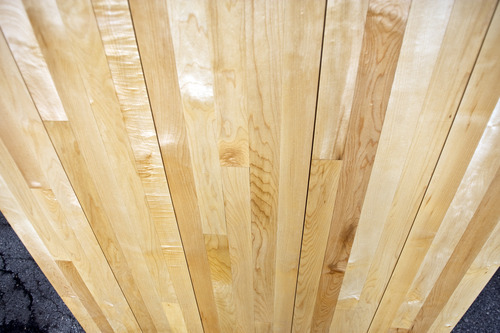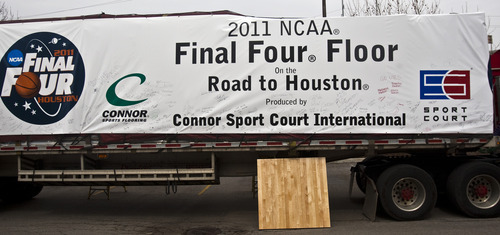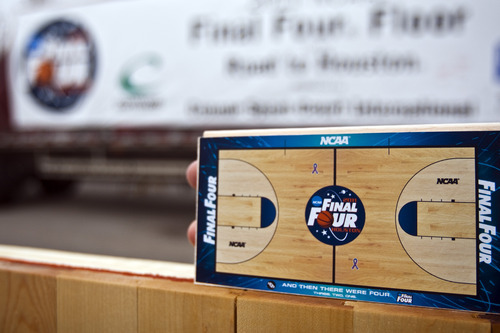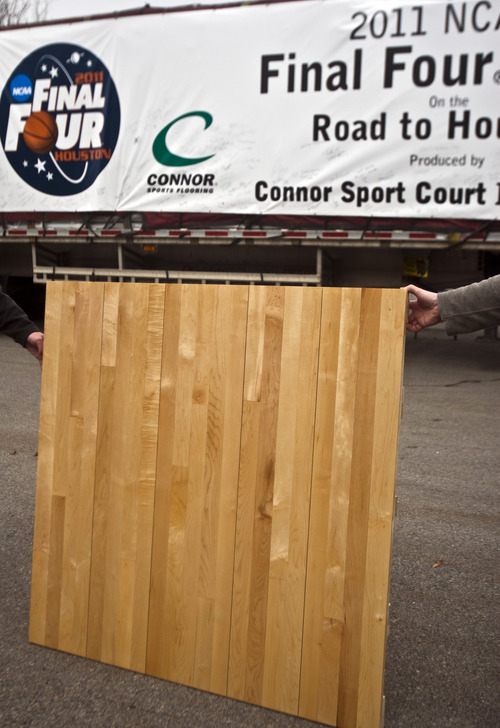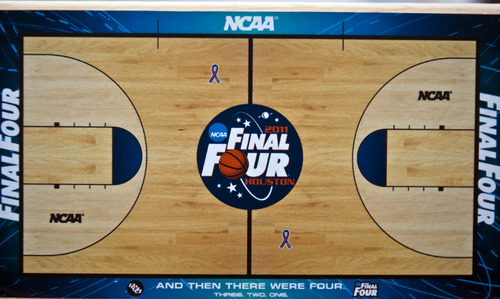This is an archived article that was published on sltrib.com in 2011, and information in the article may be outdated. It is provided only for personal research purposes and may not be reprinted.
While watching the NCAA basketball tournaments next weekend, check out the slick maple floors.
A Salt Lake City company provided them.
That makes six straight men's Final Four appearances for Connor Sport Court International, which recently signed a contract extension with the NCAA to supply the floors for college basketball's championship games (men's and women's) through 2015.
But that streak is nothing compared to Connor Sport Court's presence at NCAA volleyball tournaments. Its modular plastic tile floors have been used there for almost 20 years.
"Their product is 'A Number 1' quality," said Peter Davis, the NCAA's director of corporate alliances. "Their servicing of our products is, too. They listen to our needs, work to find solutions and deliver what we are searching for."
Endorsements like that help explain how Connor Sport Court has moved into the world of professional basketball, supplying four of the past five new courts ordered by NBA teams. And how its surfaces have been used at major sporting events from the Olympics to international tennis tournaments.
Connor Sport Court floors have been set up near Egypt's pyramids, on ocean beaches and just outside the White House for one of Michelle Obama's physical fitness promotions. But most of all, they can be found in back yards and in school gymnasiums.
That diversity is important to company president and CEO Ronald Cerny. He knows parents are just as concerned about the safety of children playing hoops at home as NCAA officials are about having a court that performs as promised and looks good on television.
"We have the lion's share of the sports floor business because we provide a good, safe product," said Cerny, a mechanical engineer out of Lafayette College in Easton, Pa. "We don't adapt our products for different sports. We design for different sports."
He has been running the company for a half-dozen years, overseeing production and warehouse/distribution facilities in Salt Lake City that employ 75 people, and a milling/manufacturing operation in Amasa, Mich., that has 150 employees.
The geographical separation reflects the fact that Connor Sport Court actually is two companies melded into one.
Connor Sports Floors dates to 1872, when William Duncan Connor began making wood flooring out of northern hard maple trees from Michigan's Upper Peninsula. He was instrumental in the 1897 founding of the Maple Flooring Manufacturers Association, which set high standards for the quality of wood used and the way it is handled in manufacturing and installation processes.
"The MFMA specifies requirements for wood floors. It's like the 'Good Housekeeping Seal of Approval,' " Cerny said, noting that suitable maple must be harvested above the 38th Parallel to ensure it has the right grain structure to be hard and resilient.
Connor Sports Floors thrived through decades of family ownership as more and more schools embraced basketball, filling their gyms with maple floors. Today, Cerny said, the company has provided more than 50 percent of all colleges with their basketball floors.
Sport Court was established in Seattle in 1974 by, as Cerny put it, "a clever guy who thought plastic, modular tiles could be applied to different sports."
He was right. Before long, Sport Court products began popping up in back yards, mostly for basketball and tennis. A decade after moving to Salt Lake City in 1979, Sport Court became the official playing surface of USA Volleyball. Four years later, its modular surface was used for the first time at the NCAA Volleyball Championships.
The companies were merged after both were purchased by a private equity firm called The Riverside Co., whose website says it owns 71 companies, has 14,000 employees and combined sales of $3.1 billion.
At the time, Cerny was running one of its operations, an automotive electronics company. But then his bosses asked "if I could do here [at Connor Sports Court] what I did there?"
A skier who had lived in Denver and liked the West, he accepted after convincing his wife they could live in Park City and he could commute to work.
Six years later, he said, "this is definitely the funnest job I've had. I've done [research and development] for a Fortune 500 company, sales, been a plant manager and in marketing. So I've seen business from all different points of view."
Almost right away, Cerny saw an opportunity to get involved with the NCAA basketball tournament. He emphasized the success Sport Court had with volleyball tournaments and secured the contract.
The unquestioned quality of the maple flooring was one factor in the decision, said the NCAA's Davis.
Cerny and his team had shown that "anyone can make a good-looking maple-strip floor. It's what's under the floor that counts," he said, "and we had 15 certified designs for underneath."
Davis said the NCAA also was impressed by the "icing on the cake" that Connor Sport Court could provide.
"They worked with us and our television partners so that the court had the right gloss so that it looks great in person and, on TV, doesn't reflect the light too much. It's that much more important now when we're dealing with high-definition and, in some cases, 3-D TV," he said.
Connor Sport Court was effective at bleaching so the wood inside the three-point line is a different shade than the wood outside of the arc and in the lane. And the customized midcourt graphics could be removed, allowing the floor to be sold after the tournament to the winning school, which could make it a new home floor or — more often these days — divide it into souvenirs for loyal fans.
"That's one of the benefits of March Madness," Davis said. "It's a national event, and people want to get their hands on it and to relive the magic for years to come."
The appeal of Connor Sport Court products goes beyond marketing and merchandising. The company recycles all of the plastic and wood it uses and incorporates it into a floor's intricate subsurface structure.
That approach is important to many building owners intent on receiving the environmental endorsement of LEED certification.
"That was critical to us," said Sallie Warmath, assistant head of school at The McGillis School in Salt Lake City. Connor Sport Court provided the floor for the gym (and an outside play area) during the recently completed 57,000-square-foot expansion of the school's facility at 700 South and 1300 East.
"It's a wonderful gym floor and underneath it has this recycled green plastic stuff that gives it spring," she said. "Connor did an amazing job working with us, painting on the multitude of lines we wanted for the multiple sports that a school plays. They were incredible. I can see why the NCAA works with them."
mikeg@sltrib.com A sporting fixture
Numerous sporting federations use Connor Sport Court playing surfaces for many of their elite competitions, including:
National Collegiate Athletic Association
USA Volleyball
National Basketball Association
International Basketball Association
U.S. Soccer Foundation
International Olympic Committee
U.S. Tennis Association
International Tennis Federation
Source: Connor Sport Court International —
Striking a balance
Connor's wood-floor business is almost 100 percent commercial — schools, civic centers, events, indoor play.
Sport Court's plastic-modular surfaces are 75 percent residential, used in people's back yards.
During the recession, said President Ronald Cerny, Connor's business flourished while Sport Court's took a hit as consumers held onto their money. But as the downturn has eased, he said, "the past four or five months Sport Court's business has grown 25-40 percent each month."


